Pride 2020: Queer Scientist Spotlights
June is Pride month, and this year, we're highlighting LGBTQ+ scientists who are doing groundbreaking research in their fields. Help us amplify these scientists' voices by reading their work and following them on social media. To discover additional LGBTQ+ scientists, @500QueerScientists and @PrideinSTEM feature LGBTQ+ scientists year round.
Below is the list of scientists we've selected to feature this year:
Molly Womack
@MollyCWomack
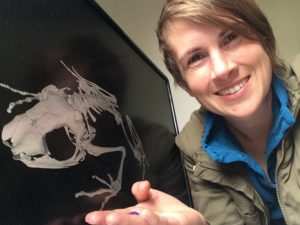
Dr. Molly Womack is an Assistant Professor at Utah State University. Her lab focuses on comparing trait development, morphology, and function among species to better understand how diversity develops, how diversity evolves, and why it matters. She's particularly excited about macroevolutionary patterns, evolutionary development, trait loss, skeletons, evolutionary constraint, hearing, sensory ecology, dogs, soccer, and hiking! To learn more about her lab, visit https://www.womacklab.com/
Carolyn Bertozzi
@CarolynBertozzi
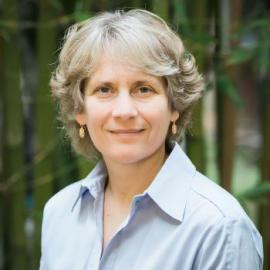
Dr. Carolyn Bertozzi is a professor at Stanford Chemistry and the Director of Stanford ChEM-H. Her group studies the glycobiology underlying diseases such as cancer, inflammatory disorders such as arthritis, and infectious diseases such as tuberculosis.
Her lab also focuses on developing new methods to perform controlled chemical reactions within living systems. The work has advanced understanding of cell surface oligosaccharides involved in cell recognition and inter-cellular communication.
Dr. Bertozzi also uses great hashtags like #glycotime. Learn more about her lab at https://bertozzigroup.stanford.edu/!
Noah Whiteman
@NKWhiteman
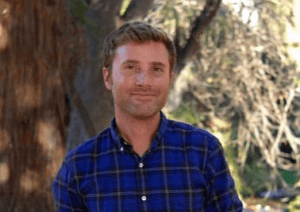
Dr. Noah Whiteman is an Associate Professor in Integrative Biology at UC Berkeley. His group studies the molecular basis of adaptations arising from the ancient arms race between toxic plants and the animals and microbes that attack them. This includes learning how monarch butterflies adapted to be able to colonize toxic milkweed plants, as well as how herbivorous insects have evolved all sorts of different specialized tools.
Dr. Whiteman grew up in rural Minnesota surrounded by forest, which inspired the naturalist in him. He was the first openly gay faculty member in his department at the University of Arizona, as well as in his department at the University of California, Berkeley.
He is a living testament that there is a seat at the table of science academia for those growing up in rural areas as well as members of the LGBTQ community, and advocates that there’s a seat for you no matter your background. Learn more about the lab here: http://www.noahwhiteman.org/
Lauren Esposito
@ArachnologyNerd
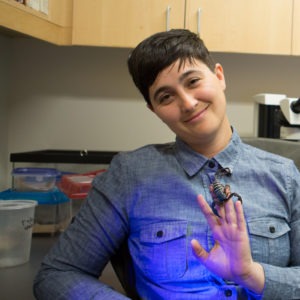
Dr. Lauren Esposito is the Schlinger Curator of Arachnology at California Academy of Sciences where she studies cool critters like scorpions and whip spiders, and their venom. Dr. Esposito talks about a lot of scorpions here!
Dr. Esposito is also interested in the interactions between biota, geology, and climate that have lead to the present-day assemblage of life on Earth. Furthermore, she is a huge advocate for students and citizen scientists. fostering the inherent wonder of nature and scientific research through public engagement.
She is the cofounder of the science and education non-profit Islands and Seas, as well as the visibility campaign 500 Queer Scientists. Learn more about Dr. Esposito and her work here: https://www.calacademy.org/staff/ibss/entomology/lauren-esposito
Izzy Jayasinghe
@i_jayas
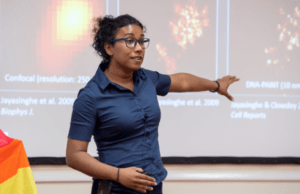
Dr. Izzy Jayasingh is a Senior Lecturer and researcher at the University of Sheffield. She is interested in super-resolution microscopy methods, and how they can be used to examine the structural basis of molecular-scale cell signaling and mechanical function.
Dr. Jayasinghe has led her group in developing new methods for mapping proteins with a resolution of near 10 nanometers (for reference, very fine human hair is ~ 60,000 nanometers wide). Learn more about her work in this video or at: https://appliedbiophotonics.org/about/.
Joseph Osmundson
@reluctantlyjoe
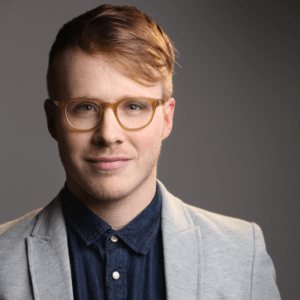
Dr. Joseph Osmundson is a scientist and writer. He is a Clinical Assistant Professor of Biology at New York University and his research focuses on cellular microbiology and transcription machinery. His writing focuses on queer theory, whiteness, and sexual identity - he has a second book out, INSIDE/OUT, discussing these themes.
Dr. Osmundson also cohosts a podcast, Food 4 Thot, tackling relevant issues. Learn more about him and his work: http://www.josephosmundson.com/
D. Andre Green
@drephd14
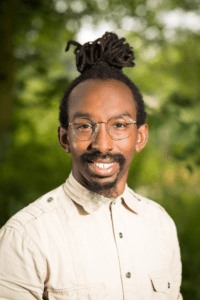
Dr. André Green is an Assistant Professor of Ecology and Evolutionary Biology at University of Michigan. HIs group studies how functional complexity emerges across different scales of biological organization, from molecules and cells to organisms and populations.
In particular, he focuses on understanding the development of phenotypically plastic traits at the molecular scale in order to illuminate general mechanisms that promote/constrain the generation of biodiversity. Dr. Green is also working to establish the monarch butterfly as a model to study the molecular genetic ‘design’ of migration and understand how this design influences evolution of the migration strategy. Learn more at: https://greendeilab.com/
Jay Keasling
@jaykeasling
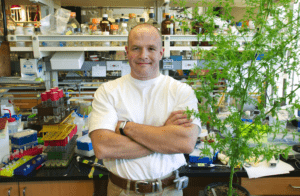
Dr. Jay Keasling is a Professor and Faculty Senior Scientist at UC Berkeley and Lawrence Berkeley National Lab. During the early 2000s, he led a UC Berkeley research team to use engineered yeast to synthetically produce artemisinin, the powerful anti-malarial drug.
Researchers at the Keasling Lab are now using the same technology to produce other pharmaceuticals, commodity chemicals, and cellulosic biofuels. Most recently, the group was able to engineer the yeast to produce THC and CBD.
Dr. Keaasling also serves as the CEO for JBEI where he has been a champion for iCLEM, a program to introduce local underserved teens to the STEM career track. Learn more about Dr. Keasling and his work here: https://keaslinglab.lbl.gov/
Powering breakthroughs for over 1,200 biotechnology companies, from startups to Fortune 500s
